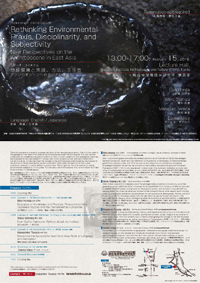[Research colloquium]
Rethinking Environmental Praxis, Disciplinarity, and Subjectivity
New Perspectives on the Anthropocene in East Asia
The Anthropocene is a recently proposed definition of the new geological epoch. That it is the name of the geological time means that time of the Anthropocene covers the entire globe. But how can the whole Earth be covered by one epoch? Even if so, how is human subjectivity and experience measured and evaluated in this time duration? The way how human subjectivity and self exists differs from culture to culture. On the one hand, the concept of the Anthropocene is hallmarked by the concept of nature/culture divide developed in western civilization. Seen under the light of the East Asian experience, however, it can be defined in another way. There might (or must) be another (or plural) environmental subjectivity in this globe ; To think about the Anthropocene is to re-think about “our” idea of environment in multiple places.
| Date & Hours: | Thursday, February 15, 2018, 13:00 - 17:00 |

|
| Venue: | Lecture Hall, RIHN( →Access) | |
| Language: | English / Japanese | |
| Remarks: | Reservation not required This colloquium is recorded and will be broadcasted in the RIHN web-site later. |
|
| Contact: | Masahiro Terada  |
Programme
- 13:00 Opening
- 13:05 - 14:05 [Lecture 1: On Disciplinarity] In English
- 14:05 - 15:05 [Lecture2 with Mini Exhibition: On Praxis] In Japanese
- 15:15 - 16:15 [Lecture3: On Subjectivity] In English
- 16:15 - 16:30 [Comment] In English
- 16:30 - 17:00 [General Discussion]
- 17:00 Closing
Eiko Honda (Oxford University)
Ecologies of Knowledge and Practice: Perspectives from Japanese Studies and the Environmental Humanities
Shiro Shimizu (Yakimono-pottery artist)
From Soil to Yakimono- Pottery: About my method
Masashiro Terada (RIHN)
Environmental Subjectivity Seen from View Point of Language and Perception
Daniel Niles (RIHN)
[Profile]
Eiko Honda
DPhil candidate, St Antony’s College / Faculty of History, University of Oxford
Eiko’s work investigates non-Cartesian intellectual and cultural histories of nature that emerged between Europe and Japan and their relevance to the practice of knowledge, including knowledge gained from practice, today. Her DPhil focuses on the history of trans-disciplinary and global knowledge formation through the life and work of the Buddhist naturalist and polymath Minakata Kumagusu (1867—1941), who specialized in slime mould. She previously worked as a curator and writer of contemporary art and ideas.
Shiro Shimizu
Yakimono-pottery artist
Shiro Shimizu was born in Gojozaka, one of the privileged areas of pottery in Kyoto city, as a third generation of the traditional potter. Influenced by his grandfather Uichi Shimizu, a holder of Important Intangible Cultural Property (Living National Treasure) of pottery, and his father Yasutaka Shimizu, famous potter, he chose the same way as them in the course of nature. After several years’ training under his grandfather and father, he established his own workshop at Matsugasaki, Norther suburb of Kyoto city, in 2013. He makes pottery with the clay which he digs by himself and fires it in his self-made kiln. By doing so, he is investigating what the essential of yakimono-pottery is.
Masahiro Terada
Visiting Associate Professor, RIHN
Masahiro Terada’s study explores history, memory, and meta-history with a focus on the relationship between history, which deals with humanity, and the environment, usually thought to be a matter of non-human things. From this position, he is currently investigating the concept of the Anthropocene in the East Asian perspective, as well as the problem of “futurography.”
Daniel Niles
Associate Professor, RIHN
Daniel Niles is a human-environmental geographer interested in how people understand nature. His research focuses on the material and immaterial cultural elements found in long-standing agro-ecological complexes, and how they illuminate specific cultural understandings of nature (including Anthropocene), environment, landscape, agriculture, and people.

